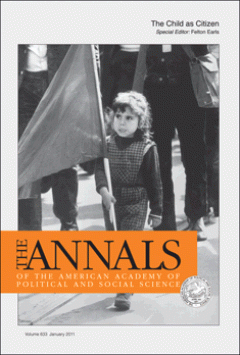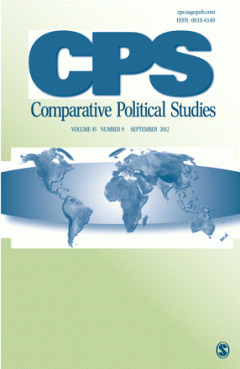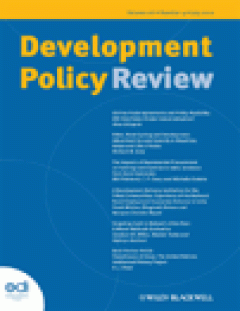Filter by

Participatory Niches for Emergent Citizenship in Early Adolescence: An Intern…
This article is based on the assumption that the right to vote in national elections is not an essential dimension of citizenship for early adolescents as long as adolescents’ other competencies and attitudes are nurtured in their everyday settings. The article addresses the issue of children or early adolescents and their political and civic participation from three perspectives. First, it exa…
- Edition
- Vol. 633 no. 1, January 2011.pp. 180-200
- ISBN/ISSN
- 00027162
- Collation
- -
- Series Title
- The ANNALS of the American Academy of Political and Social Science
- Call Number
- -

American Sixteen- and Seventeen-Year-Olds Are Ready to Vote
American 16- and 17-year-olds ought to be allowed to vote in state and national elections. This claim rests upon a line of argument that begins with an exegesis of legal and philosophical notions of citizenship that identify core qualities of citizenship: membership, concern for rights, and participation in society. Each of these qualities is present in rudimentary form in childhood and adolesc…
- Edition
- Vol. 633 no. 1.January 2011.pp. 201-222
- ISBN/ISSN
- 00027162
- Collation
- -
- Series Title
- he ANNALS of the American Academy of Political and Social Science
- Call Number
- -

Adolescents as Deliberative Citizens: Building Health Competence in Local Com…
Given the host of tragic events that children experience, it is often compelling for well-intended adults to respond in a protective and charitable fashion. The child rights approach asks for more. Building on their collective experiences in the developmental and social sciences, the authors present in roughly chronological fashion a synopsis of the theoretical explorations and scientific evalu…
- Edition
- Vol. 633 no. 1. January 2011. pp. 223-242
- ISBN/ISSN
- 00027162
- Collation
- -
- Series Title
- The ANNALS of the American Academy of Political and Social Science
- Call Number
- -

Promoting Children’s Capacities for Active and Deliberative Citizenship wit…
This article explains several core aspects of the experience of the Omar Dengo Foundation of Costa Rica in the development of the Deliberative Capabilities in School Age Children project, a set of citizenship education programs based on the conception of children as citizens and on a particular conception of the role of digital technologies in the promotion of children’s high-order skills. It a…
- Edition
- Vol. 633 no. 1. January 2011.pp. 243-262
- ISBN/ISSN
- 00027162
- Collation
- -
- Series Title
- The ANNALS of the American Academy of Political and Social Science
- Call Number
- -

Creating a Capable Bureaucracy With Loyalists: The Internal Dynamics of the S…
This study explores why South Korea’s top leadership combined a merit-based principle with region-based particularistic elements in the recruitment and promotion of career bureaucrats of the Ministry of Commerce and Industry (MCI) during its industrial takeoff in the 1960s and 1970s. It also investigates how this recruitment and promotion style was emulated by business sectors as a way of secur…
- Edition
- Volol. 44 no. 1. January 2011.pp. 78-108
- ISBN/ISSN
- 00104140
- Collation
- -
- Series Title
- Comparative Political Studies
- Call Number
- -

The Political Role of Service Delivery in State-Building: Exploring the Relev…
Concerns about failed and fragile states have put state- and nation-building firmly on the academic and policy agenda, but the crucial role of public services in this process has remained underexplored. The 1960s and ‘70s generated a substantial set of literature that is largely missing from current writing. It identified state penetration, standardisation and accommodation as key processes in …
- Edition
- Volume 29, Issue 1, January 2011. pages 5–21
- ISBN/ISSN
- 14675986
- Collation
- -
- Series Title
- Development Policy Review
- Call Number
- -

The View from Le Château: USAID's Recent Decentralisation Programming in Uganda
This article makes three linked arguments. (i) USAID's decentralisation portfolio in Uganda was launched, ironically, at precisely the time when the government was reorienting itself toward recentralisation. (ii) Because of the prevalence of dehistoricised approaches to policy, design, practice and evaluation, USAID programmers could not fully assess the contextual situation of their decentrali…
- Edition
- Volume 29, Issue 1, January 2011. pages 23–46
- ISBN/ISSN
- 14675986
- Collation
- -
- Series Title
- Development Policy Review
- Call Number
- -

Infrastructure Privatisation: Oversold, Misunderstood and Inappropriate
Infrastructure privatisation aimed to finance capital investment and improve efficiency, but the results have been disappointing because of the mismatch between privatisation theory and the characteristics of infrastructure and utility projects in developing countries. This article reviews the evidence and seeks to explain the results in terms of the high capital costs and low revenues that hav…
- Edition
- Volume 29, Issue 1, January 2011. pages 47–74
- ISBN/ISSN
- 14675986
- Collation
- -
- Series Title
- Development Policy Review
- Call Number
- -

The Millennium Development Goals: Key Current Issues and Challenges
The current global financial and economic crisis has severely impaired social and economic progress throughout the world. Does this mean the end of the Millennium Development Goals (MDGs)? This article addresses this question, considering selected theoretical and strategic issues, including new and incremental approaches, the role of governmental leadership and operational integrity and the und…
- Edition
- Volume 29, Issue 1, January 2011. pages 75–90
- ISBN/ISSN
- 14675986
- Collation
- -
- Series Title
- Development Policy Review
- Call Number
- -

From Commoditisation to De-commoditisation … and Back Again: Discussing the…
Sustainability standards are flooding global agricultural markets. Standards, however, are not new. This article analyses, from a historical perspective, the implications of the transition from traditional to sustainability standards in the commoditisation/de-commoditisation process. It shows how early standards contributed to the construction of the category of primary commodities and how, aft…
- Edition
- Volume 29, Issue 1, January 2011. pages 91–113
- ISBN/ISSN
- 14675986
- Collation
- -
- Series Title
- Development Policy Review
- Call Number
- -

Marketing Reform? The Rise and Fall of Agricultural Liberalisation in Tanzania
This article argues that the liberalisation of Tanzanian export agriculture from the early 1990s to the present has failed to take place to the extent claimed by the Tanzanian government and donor agencies. While internal food markets have largely been liberalised, donor-inspired attempts to liberalise export crop markets have been seriously undermined by the political-bureaucratic class. As in…
- Edition
- Vol 29, Supplement s1, January 2011.pages s57–s81
- ISBN/ISSN
- 14675986
- Collation
- -
- Series Title
- Development Policy Review Special Issue: Aid, Institutions and Governance: What Have We Learned?
- Call Number
- -

Aid, Institutions and Governance: What Have We Learned?
Understanding of the relationship between institutions and economic progress made major headway in the 1990s. Since 2000 the pace of intellectual advance has been stepped up, with fresh thinking especially on governance systems and the role of aid. This article illustrates these propositions with special reference to relevant contributions to DPR over the period. Three particular topics are add…
- Edition
- Volume 29, Issue Supplement s1, January 2011. page
- ISBN/ISSN
- 14675986
- Collation
- -
- Series Title
- Development Policy Review Special Issue: Aid, Institutions and Governance: What Have We Learned?
- Call Number
- -

Politics and Growth
Theories of growth have made progress in understanding the mechanisms of growth in economic terms. However, there is less understanding of the political processes that enable or obstruct these mechanisms. This article provides a four-stage framework to clarify and analyse the connections between politics and growth: (i) discussing the basic conditions essential for growth; (ii) suggesting that …
- Edition
- Vol 29, Supplement s1, January 2011, pages s28–s55
- ISBN/ISSN
- 14675986
- Collation
- -
- Series Title
- Development Policy Review Special Issue: Aid, Institutions and Governance: What Have We Learned?
- Call Number
- -

The Macroeconomics of Doubling Aid to Africa and the Centrality of the Supply…
The proposed doubling of aid to Africa by 2010 is a less simple proposition, from a recipient point of view, than is commonly supposed. This article argues that it is difficult to manage large and rapidly increasing aid inflows in ways which do not disadvantage producers of tradeable goods, and the private sector generally. This difficulty can be averted if conscious efforts are made to offset …
- Edition
- Vol 29, Supplement s1, Jan 2011. pages s83–s108
- ISBN/ISSN
- 14675986
- Collation
- -
- Series Title
- Development Policy Review Special Issue: Aid, Institutions and Governance: What Have We Learned?
- Call Number
- -

The PRSP Approach and the Illusion of Improved Aid Effectiveness: Lessons fro…
Since 1999, poor countries that want to qualify for concessionary IMF loans and debt relief must elaborate and implement Poverty Reduction Strategy Papers. Donors claim that the PRSP approach will increase aid effectiveness since PRSPs will enhance broad country ownership and lead to better ‘partnership’ with donors, implying more donor co-ordination under government leadership. By examining th…
- Edition
- Vol 29, Supplement s1, Jan 2011. pages s110–s133
- ISBN/ISSN
- 14675986
- Collation
- -
- Series Title
- Development Policy Review Special Issue: Aid, Institutions and Governance: What Have We Learned?
- Call Number
- -

The Poverty Reduction Strategy Approach Six Years On: An Examination of Princ…
It is over six years since the World Bank and the IMF started promoting a PRS approach to development management in low-income countries. The 2005 review endorsed the approach, but highlighted the need for a renewed focus on the principles underpinning it: country ownership; results orientation; comprehensiveness; partnership focus; and long-term outlook. Uganda is often hailed as one of the be…
- Edition
- Vol 29, Supplement s1, Jan 2011. pages s135–s156
- ISBN/ISSN
- 14675986
- Collation
- -
- Series Title
- Development Policy Review Special Issue: Aid, Institutions and Governance: What Have We Learned?
- Call Number
- -

Interobjectivity: Representations and artefacts in Cultural Psychology
This paper revisits the emerging concept of interobjectivity and furthers Moghaddam’s (2003, 2006) proposal to prioritize this concept in Cultural Psychology. We argue that Heidegger’s phenomenology provides insights into a foundational understanding of what interobjectivity entails. We argue that human relations are not essentially characterized by intersubjective relations but rely on the non…
- Edition
- Vol. 16 no. 4. December 2010.pp. 451-463
- ISBN/ISSN
- 1354067x
- Collation
- -
- Series Title
- Culture Psychology
- Call Number
- -

Commentary: Intersubjectivity, interobjectivity, and the embryonic fallacy in…
Traditional research adopts the embryonic fallacy: the assumption that as soon as life begins, the individual becomes the source of psychological experiences. The embryonic fallacy has resulted in intersubjectivity being treated as ‘a problem’: how can each individual, the source of private experiences, understand the private experiences of ‘self-contained’ others? This ‘problem’ disappears whe…
- Edition
- Vol. 16 no. 4. December 2010.pp. 465-475
- ISBN/ISSN
- 1354067x
- Collation
- -
- Series Title
- Culture Psychology
- Call Number
- -

Elective interdependence: Understanding individual agency and interpersonal r…
Parents’ beliefs and ethnotheories about family life in general and childcare in particular contain explicit and implicit ideas about the manner in which children ought to be raised. Cultural scripts, family situations, and parents’ own beliefs and experiences have been known to guide parenting choices. Cultural practices in India have been deeply influenced by the textured history of external …
- Edition
- Vol. 16 no. 4. December 2010.pp. 477-496
- ISBN/ISSN
- 1354067x
- Collation
- -
- Series Title
- Culture Psychology
- Call Number
- -

User-assisted query translation for interactive cross-language information re…
Interactive Cross-Language Information Retrieval (CLIR), a process in which searcher and system collaborate to find documents that satisfy an information need regardless of the language in which those documents are written, calls for designs in which synergies between searcher and system can be leveraged so that the strengths of one can cover weaknesses of the other. This paper describes …
- Edition
- Vol. 44, No. 1, Page 181-211
- ISBN/ISSN
- 0306-4573
- Collation
- -
- Series Title
- Information Processing & Management
- Call Number
- -
 Computer Science, Information & General Works
Computer Science, Information & General Works  Philosophy & Psychology
Philosophy & Psychology  Religion
Religion  Social Sciences
Social Sciences  Language
Language  Pure Science
Pure Science  Applied Sciences
Applied Sciences  Art & Recreation
Art & Recreation  Literature
Literature  History & Geography
History & Geography